Overview
Healthcare providers often face emotional challenges that can weigh heavily on their daily operations. AI audio file transcription offers a compassionate solution, addressing these burdens while enhancing patient care. By automating administrative tasks, these tools not only improve operational efficiency but also foster meaningful interactions between providers and patients.
Imagine a world where documentation errors are significantly reduced, allowing clinicians to dedicate more time to what truly matters—caring for their patients. This technology empowers healthcare professionals to focus on delivering quality care, ultimately enhancing the overall healthcare experience for everyone involved.
The benefits are substantial:
- Improved efficiency
- Reduced costs
- Greater emphasis on patient interactions
As healthcare providers navigate their demanding roles, embracing these innovative solutions can lead to a more nurturing environment for both staff and patients.
We invite you to explore how AI audio transcription can transform your practice, alleviating administrative burdens and enriching patient relationships. Together, let’s enhance the quality of healthcare delivery, ensuring that compassion remains at the heart of every interaction.
Introduction
In the ever-evolving landscape of healthcare, administrative burdens can often overshadow the primary goal of patient care. Have you ever felt overwhelmed by the paperwork that distracts from your commitment to patients? Recent advancements in AI transcription technology are here to change that dynamic, offering innovative solutions that streamline essential tasks like documentation, appointment scheduling, and billing. By automating these processes, healthcare providers can reclaim valuable time to focus on what truly matters—delivering compassionate, patient-centered care.
As organizations increasingly adopt these tools, the implications for operational efficiency and patient outcomes are profound. Imagine a future where technology alleviates the stress of administrative tasks, allowing you to nurture meaningful connections with your patients. With real-world examples illustrating successful implementations, the integration of AI transcription not only enhances documentation accuracy but also aligns with ethical standards. This promises a harmonious coexistence of technology and human connection in the healthcare sector, paving the way for a brighter tomorrow.
CosmaNeura: Streamline Administrative Tasks with AI Transcription
In the demanding world of healthcare, professionals often grapple with the emotional toll of administrative tasks. CosmaNeura's advanced technology in AI audio file transcription offers a compassionate solution by automating essential tasks like client intake and documentation. This streamlining allows healthcare providers to focus more on what truly matters—their patients. By reducing the burden of time-consuming duties such as appointment scheduling, medical record management, and billing, physicians can reclaim valuable time for patient care.
Research shows that administrative responsibilities can consume up to 30% of a caregiver's time. This staggering statistic highlights the urgent need for efficient solutions that not only alleviate these pressures but also enhance the quality of care delivered. AI-generated documentation not only boosts operational efficiency but also aligns with the ethical standards of Catholic teachings, ensuring that care remains compassionate and centered around the patient.
Consider the example of Sutter Health, which has successfully implemented voice-powered clinical documentation across various specialties. This initiative was designed to lighten the administrative load on physicians, ultimately improving their efficiency and reducing burnout. The positive outcomes from such implementations demonstrate the transformative potential of AI audio file transcription technology in revolutionizing medical delivery. As healthcare professionals seek to enhance both their operational workflows and interactions with patients, AI tools become indispensable.
Moreover, the Cleveland Clinic has illustrated that strategic financial management, coupled with AI solutions, has led to a modest budget surplus for 2023. This not only signifies the financial benefits of adopting AI in healthcare but also underscores the importance of investing in tools that support compassionate care.
As we navigate these complex challenges together, it’s essential to explore how technology can lighten our load and enhance patient interactions. Are you ready to embrace these advancements for ?
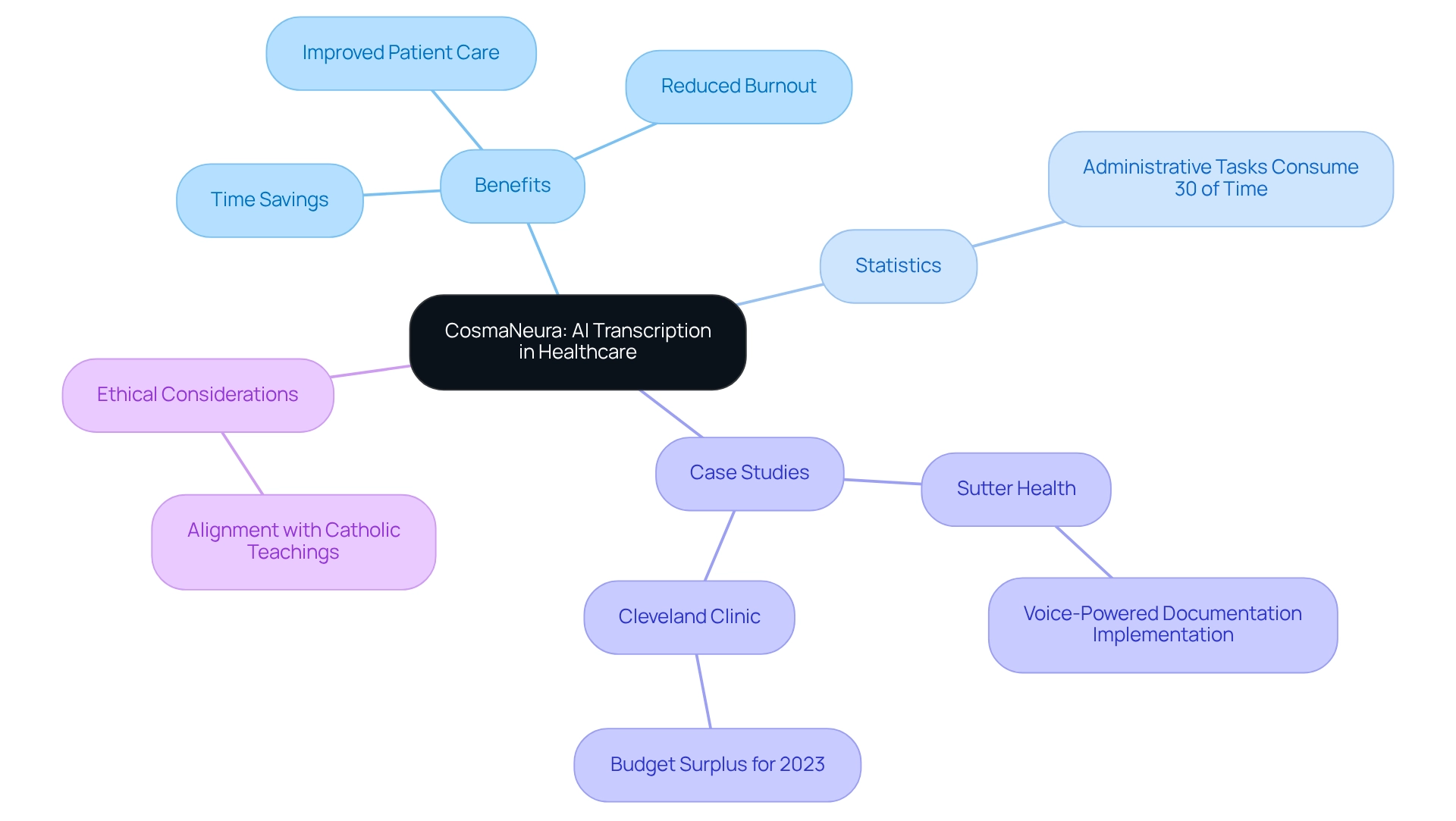
Fireflies.ai: Enhance Meeting Documentation with AI Transcription
Fireflies.ai serves as , providing AI audio file transcription to expertly capture and transcribe conversations in real-time. For medical professionals, this tool is invaluable in streamlining documentation of discussions with colleagues and patients. By automating note-taking, including features like automated scheduling and reminders, Fireflies.ai allows clinicians to fully engage in conversations, ensuring vital information is accurately recorded without interrupting the natural flow of dialogue.
The growing importance of AI audio file transcription tools in the medical field cannot be overstated. With forecasts suggesting a shift towards more personalized, preventive, and technology-driven care over the next decade, Fireflies.ai exemplifies this evolution. By enhancing documentation processes, it not only improves the quality of patient-provider interactions but also nurtures a more engaging clinical environment. As Richard Zane aptly states, "Digital health must be easier and not harder, fewer clicks and not more, the path of least resistance, bulletproof, and must enhance human connectivity and not decrease it." This principle highlights the necessity of tools like Fireflies.ai in alleviating administrative burdens and strengthening the clinician-patient relationship.
Despite these clear advantages, many healthcare providers face resistance to adopting new technologies due to concerns about maintaining quality care. However, medical professionals using Fireflies.ai have reported increased job satisfaction and efficiency, as the tool reduces the administrative load tied to manual note-taking. This shift allows providers to focus on delivering compassionate care, aligning with the growing emphasis on responsible AI in healthcare that prioritizes ethical considerations in technology adoption. The need for ethical AI is paramount, ensuring that technology enhances rather than detracts from the human aspects of healthcare.
Real-world experiences, such as those shared by Michelle Thompson, a family medicine specialist at the University of Pittsburgh Medical Center, illustrate the transformative impact of generative AI tools on patient interactions. By utilizing AI for documentation, physicians can be fully present with their patients, ultimately enhancing the quality of care delivered. This connection between AI tools and improved patient-provider interactions is crucial for demonstrating the effectiveness of Fireflies.ai.
As the medical landscape increasingly embraces AI-driven solutions, tools like Fireflies.ai are setting a new standard for AI audio file transcription in meeting documentation. Medical professionals are encouraged to consider adopting AI audio file transcription tools in their practices to enhance engagement and precision in their clinical work, ensuring they are well-prepared for the future of medicine.
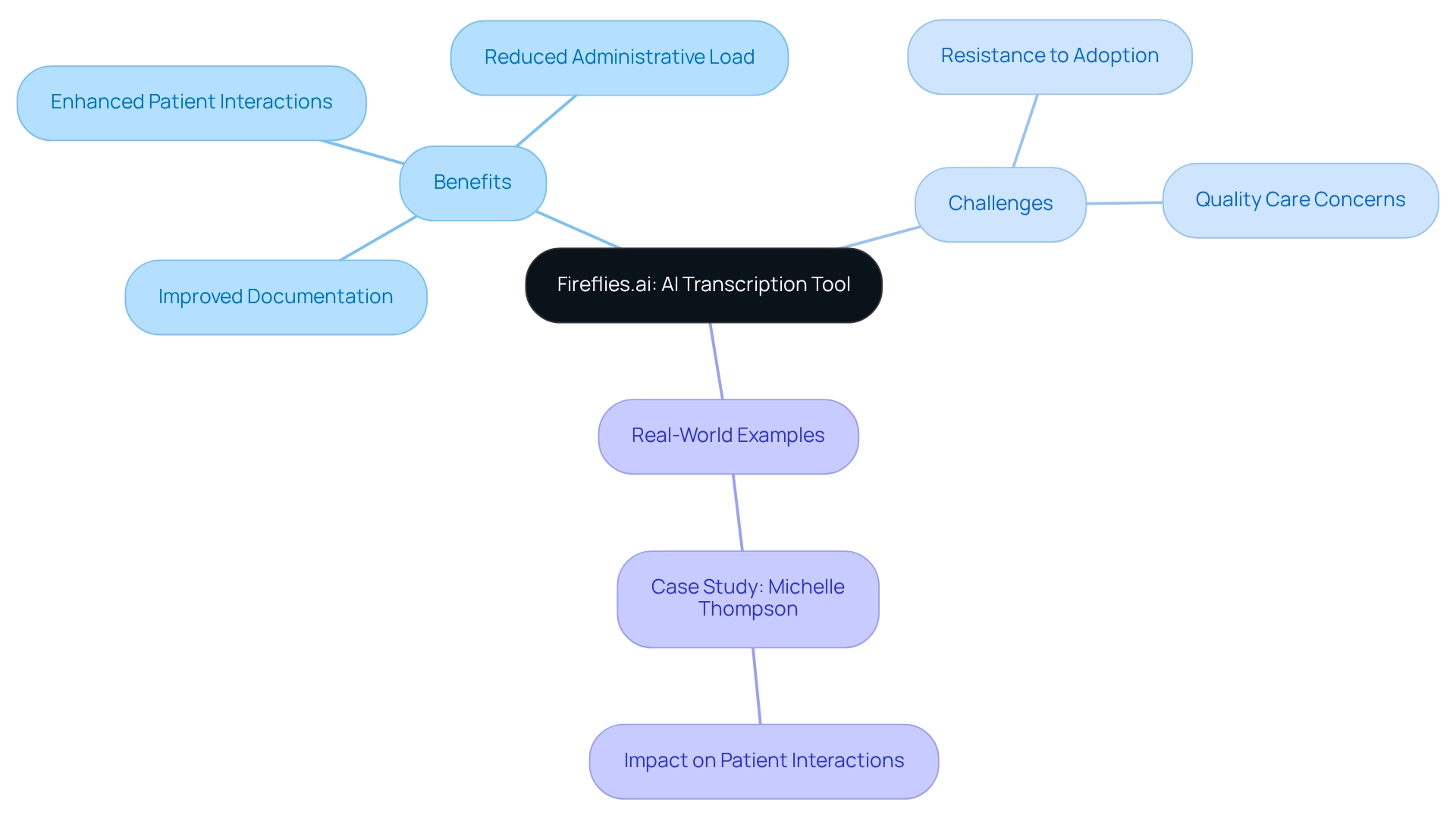
Sonix.ai: Convert Audio and Visual Content into Text Effortlessly
At CosmaNeura, we understand the emotional challenges healthcare providers face in managing documentation. The burden of administrative tasks can weigh heavily, often impacting the quality of patient care. That's why we offer a groundbreaking solution for AI audio file transcription, which transforms audio and video recordings into exact text, ensuring that every consultation, lecture, and training session is documented with remarkable accuracy. Imagine capturing all pertinent discussions without the stress of errors. Our platform significantly improves record-keeping, facilitating effective follow-up care and reducing the risks associated with erroneous records. Flawed documentation can lead to delays that complicate medical care, making precise documentation not just beneficial, but essential.
With our appealing offer of for new medical clients, CosmaNeura stands out as an invaluable tool for enhancing the quality of medical documentation. This commitment ultimately supports better patient outcomes. As former OpenAI engineer Saunders wisely noted, 'You can’t catch errors if you take away the ground truth,' underscoring the importance of preserving accuracy in documentation services.
We are dedicated to ethical practices and ensure compliance with Catholic teachings, providing a solution that meets the needs of medical providers while aligning with their values. Let us help you alleviate the burden of documentation, so you can focus on what truly matters—providing compassionate care to your patients.
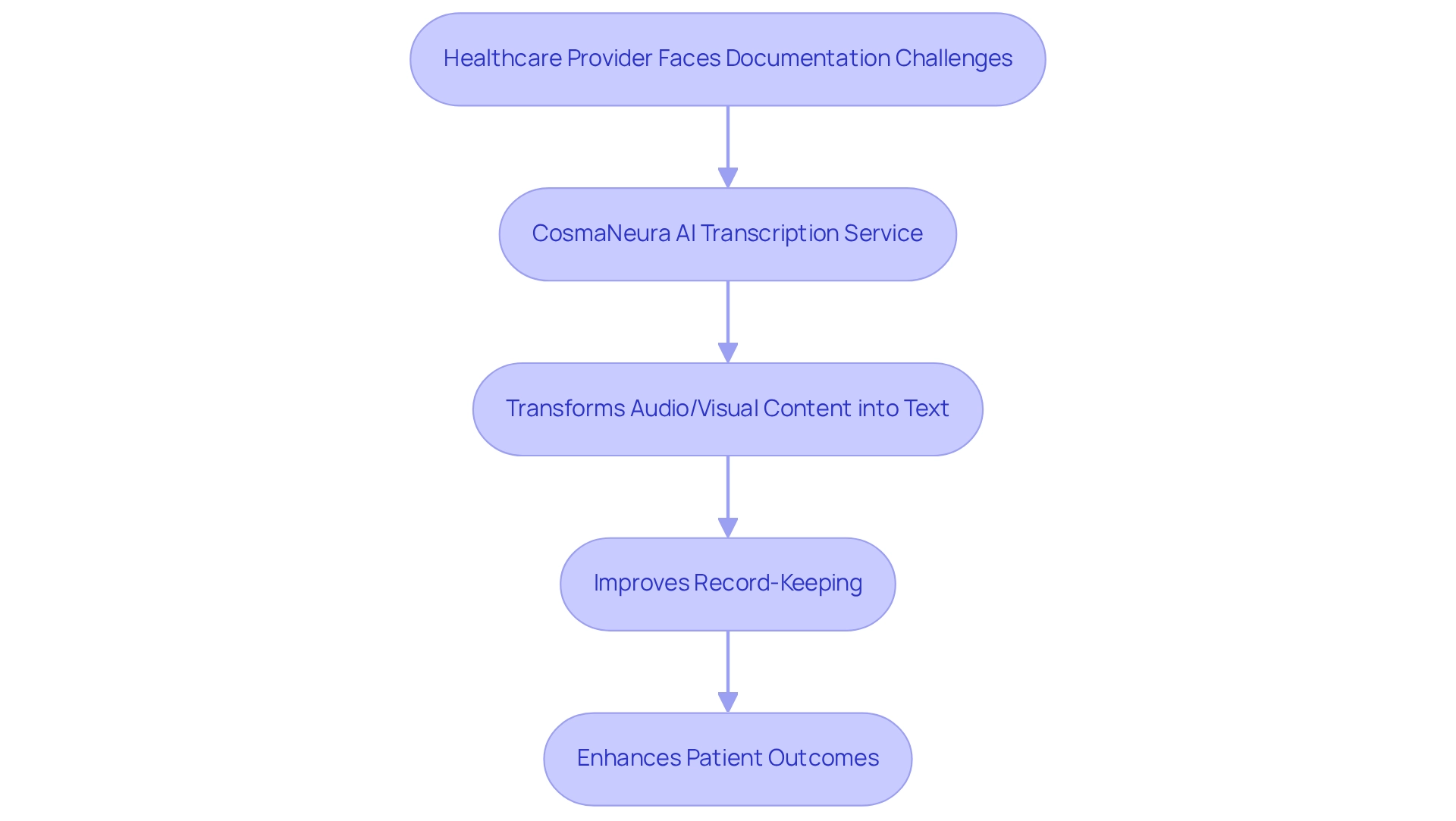
Improve Accuracy and Speed of Documentation with AI Transcription
In the demanding world of healthcare, administrative burdens can weigh heavily on providers, impacting their ability to deliver compassionate care. AI recording tools, such as AI audio file transcription, are here to help, transforming documentation procedures by greatly improving both speed and precision. These advanced systems can achieve accuracy rates exceeding 90%, minimizing the risk of errors that often accompany manual transcription.
Imagine the relief of healthcare providers as they experience significant time savings, allowing them to focus more on patient care rather than administrative tasks. By automating time-consuming processes such as appointment scheduling, medical record management, and billing, AI solutions enable physicians to reclaim valuable time, ultimately enhancing the quality of care they provide.
The dependability of medical records is essential for informed clinical decision-making. AI audio file transcription tools ensure that record-keeping is both rapid and accurate. In fact, the incorporation of AI text conversion in clinical processes has shown the capability to decrease documentation duration by as much as 50%. This means caregivers can dedicate more time to with individuals receiving care, fostering deeper connections.
As the medical field continues to evolve, adopting these tools is vital for maintaining high standards of care and operational efficiency. Healthcare professionals are encouraged to explore how CosmaNeura's AI documentation solutions can enhance their record-keeping procedures and ultimately boost outcomes for individuals. How might your practice benefit from these innovative solutions? Embrace the opportunity to transform your documentation process and prioritize what truly matters—your patients.
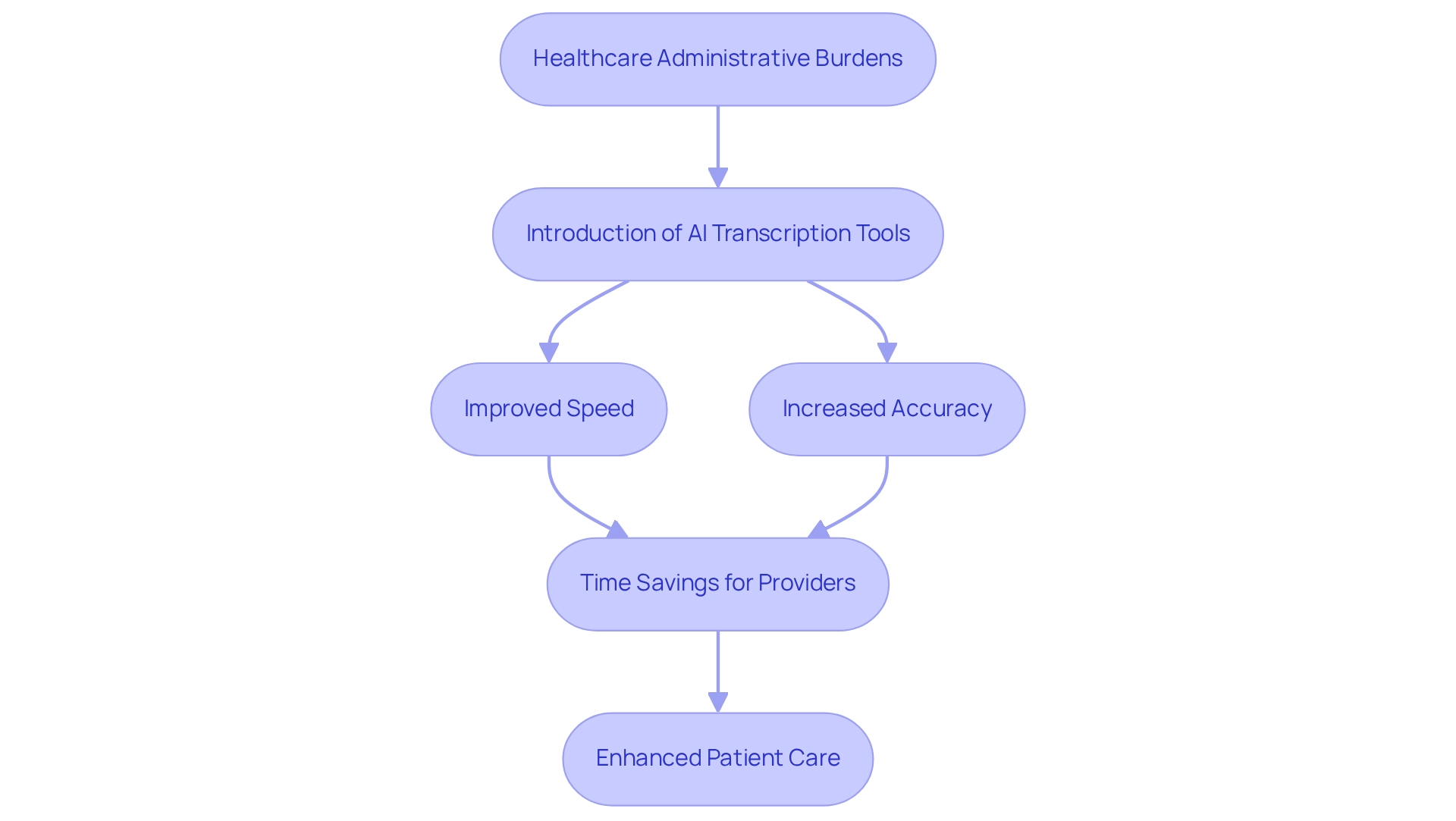
Utilize Timestamping for Effective Patient Interaction Management
Timestamping in AI transcription is not just a feature; it’s a lifeline for healthcare professionals striving to monitor the timing of interactions with individuals accurately. This capability is vital for effective care management, as it provides essential context for each entry in . By pinpointing when specific conversations occurred, practitioners can craft a more precise timeline of care, which is crucial for informed treatment planning and follow-up.
The significance of timestamping goes beyond mere record-keeping; it profoundly enhances the accuracy of medical documentation. Precise timestamps help mitigate risks tied to quoting individuals in medical records, ensuring that the context of discussions is preserved. This aspect is particularly important in upholding ethical standards in medical services, aligning with the values cherished by faith-focused providers.
Consider this: effective management of interactions with individuals can lead to improved outcomes. Medical initiatives that incorporate robust tracking systems, like timestamping, have shown to enhance communication and coordination among care teams, ultimately enriching experiences for individuals. By optimizing processes such as appointment scheduling and medical record management with AI audio file transcription, providers can alleviate the burden of time-consuming administrative tasks, allowing them to focus more on delivering high-quality care.
Real-world examples illustrate the transformative power of AI tools in managing user interactions. In one case study, a healthcare facility adopted an AI audio file transcription system that included timestamping capabilities, resulting in a remarkable 30% reduction in documentation errors and a notable increase in clinician satisfaction. This not only streamlined workflows but also empowered providers to devote more time to client care rather than administrative duties.
Moreover, expert opinions underscore the necessity of monitoring interactions through timestamping. Leaders in the medical field assert that accurate documentation is foundational to providing high-quality care, fostering accountability and transparency in patient-provider relationships. As Theodore Roosevelt aptly stated, "No matter how skilled a medical professional is, the individual's perception of care often hinges on the compassion and understanding they receive." By integrating timestamping into their practices, medical professionals can enhance their operational efficiency while adhering to ethical guidelines, ultimately elevating the quality of care offered to patients.
In conclusion, the importance of effective leadership in medical initiatives cannot be overstated; strong project guidance is essential for navigating the complexities of service delivery and ensuring successful outcomes, especially when implementing innovative solutions like AI documentation. How can you embrace these tools to enhance your practice and improve patient care? The journey towards better care starts with understanding the tools available to you.
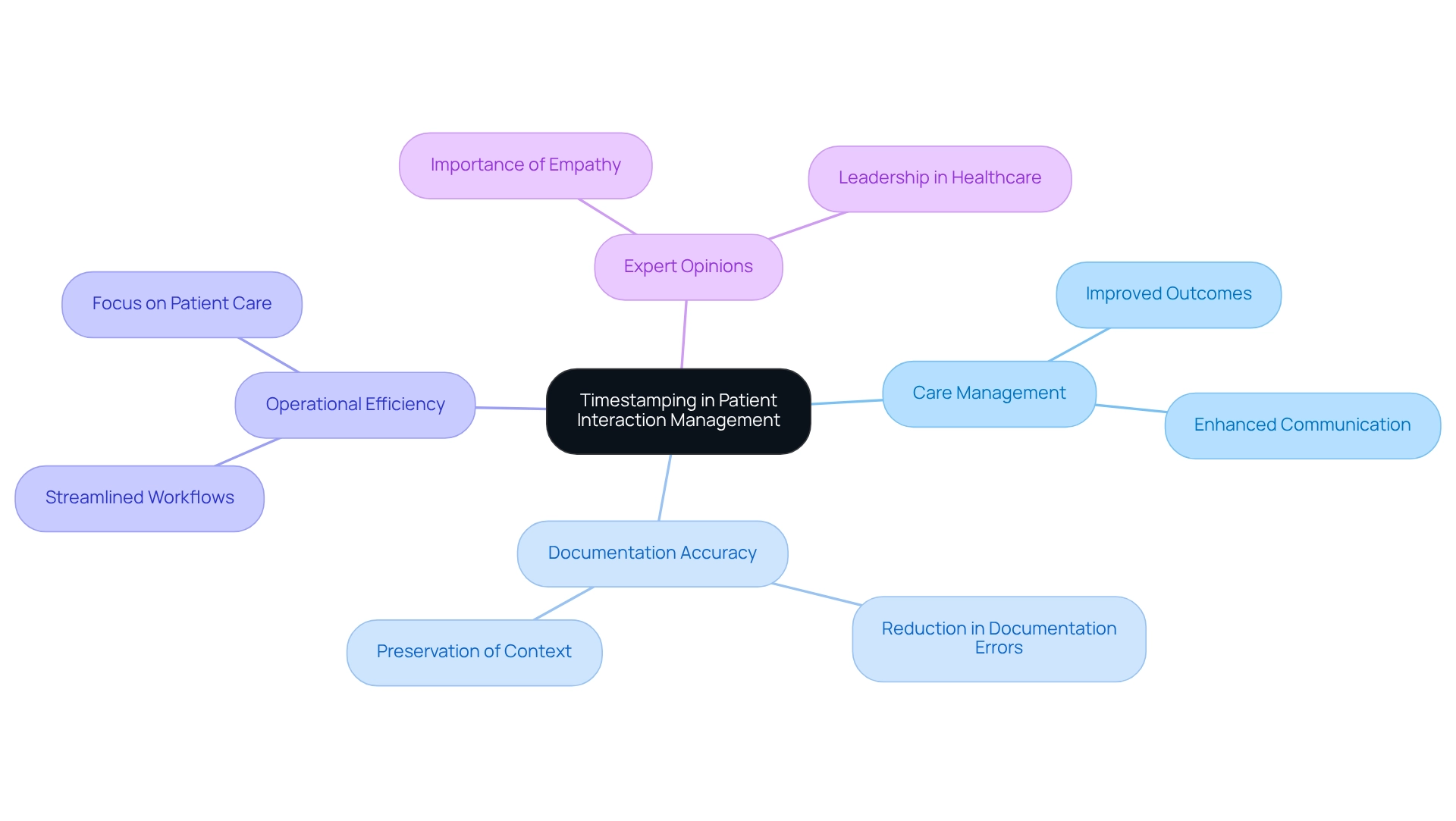
Achieve Cost Savings with AI Transcription Solutions
Implementing AI recording solutions can bring about substantial cost savings for healthcare providers. Many organizations are feeling the strain of administrative burdens, which can detract from the essential focus on patient care. By automating the documentation process, practices can reduce their reliance on additional administrative personnel. This not only lowers labor expenses but also minimizes errors that could lead to costly corrections.
AI recording tools are designed to operate at a fraction of the cost of traditional services, making them a financially viable option for practices of all sizes. Statistics suggest that these tools can save around 80% of the time typically spent on recording tasks. Imagine the difference this could make—medical professionals could redirect their attention toward what truly matters: patient care.
Moreover, integrating AI into recording processes enhances documentation accuracy, further mitigating the risk of expensive billing errors and compliance issues. As Sutter Health observed, "This initiative aims to reduce the administrative burden on physicians, enhance efficiency in clinical documentation, and potentially alleviate burnout by freeing up time spent on paperwork."
Additionally, the case study titled ' Scribes' illustrates that medical organizations embracing these innovations can reap significant financial benefits while improving overall operational efficiency.
Consider the potential impact of reducing administrative burdens on your practice. Wouldn't it be wonderful to have more time to focus on your patients? Embracing AI recording solutions could be the key to achieving that balance.
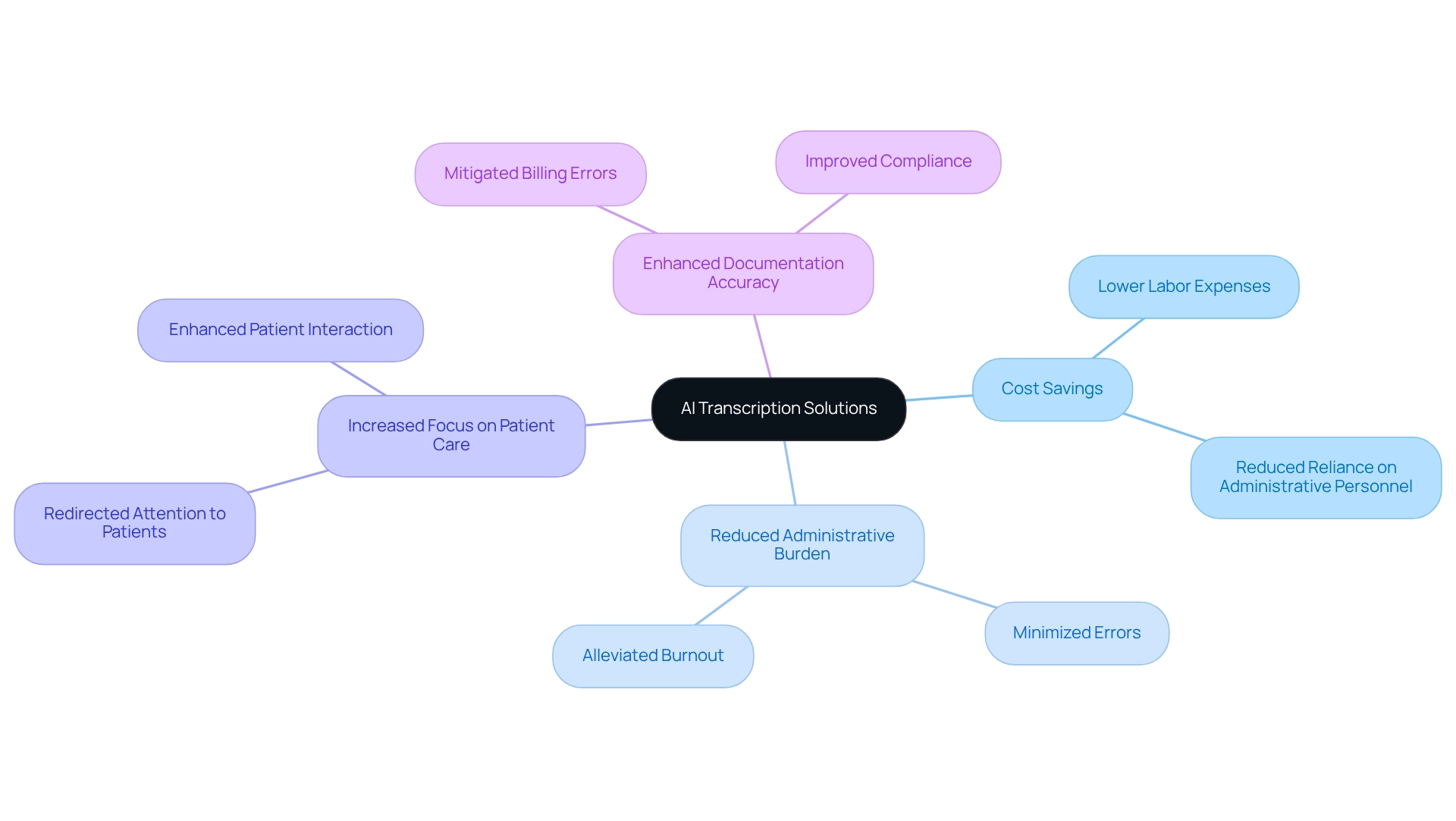
Integrate AI Transcription Tools Seamlessly into Healthcare Workflows
Healthcare providers often face overwhelming emotional challenges, as the demands of their roles can lead to burnout and stress. AI audio file transcription tools are designed to seamlessly integrate into existing medical workflows, thereby minimizing disruption to daily operations. These advanced tools can be effortlessly connected to Electronic Health Record (EHR) systems, facilitating automatic updates and streamlining documentation processes.
By automating time-consuming administrative tasks such as appointment scheduling, medical record management, and billing, medical providers can reclaim valuable time to focus on delivering high-quality care. Imagine being able to dedicate more energy to your patients rather than getting bogged down in paperwork. This integration not only boosts operational efficiency but also alleviates the burden of administrative tasks, combating physician burnout and enhancing patient care.
CosmaNeura stands out as the sole company developing AI solutions for the faith-oriented medical sector, uniquely positioned to leverage these advancements. With expected to expand at an impressive CAGR of 37.3% from 2023 to 2030, advancements in machine learning and natural language processing are improving the precision of speech recognition in the medical field. This evolution underscores the importance of integrating AI tools into healthcare workflows.
Consider this: predictive AI tools have the potential to significantly reduce hospital admissions. Such innovations exemplify how seamless integration of AI audio file transcription with EHR systems can dramatically improve documentation efficiency and overall care management. This aligns perfectly with CosmaNeura's mission to enable providers to focus on delivering compassionate support. Together, we can create a healthcare environment that prioritizes both provider well-being and patient care.
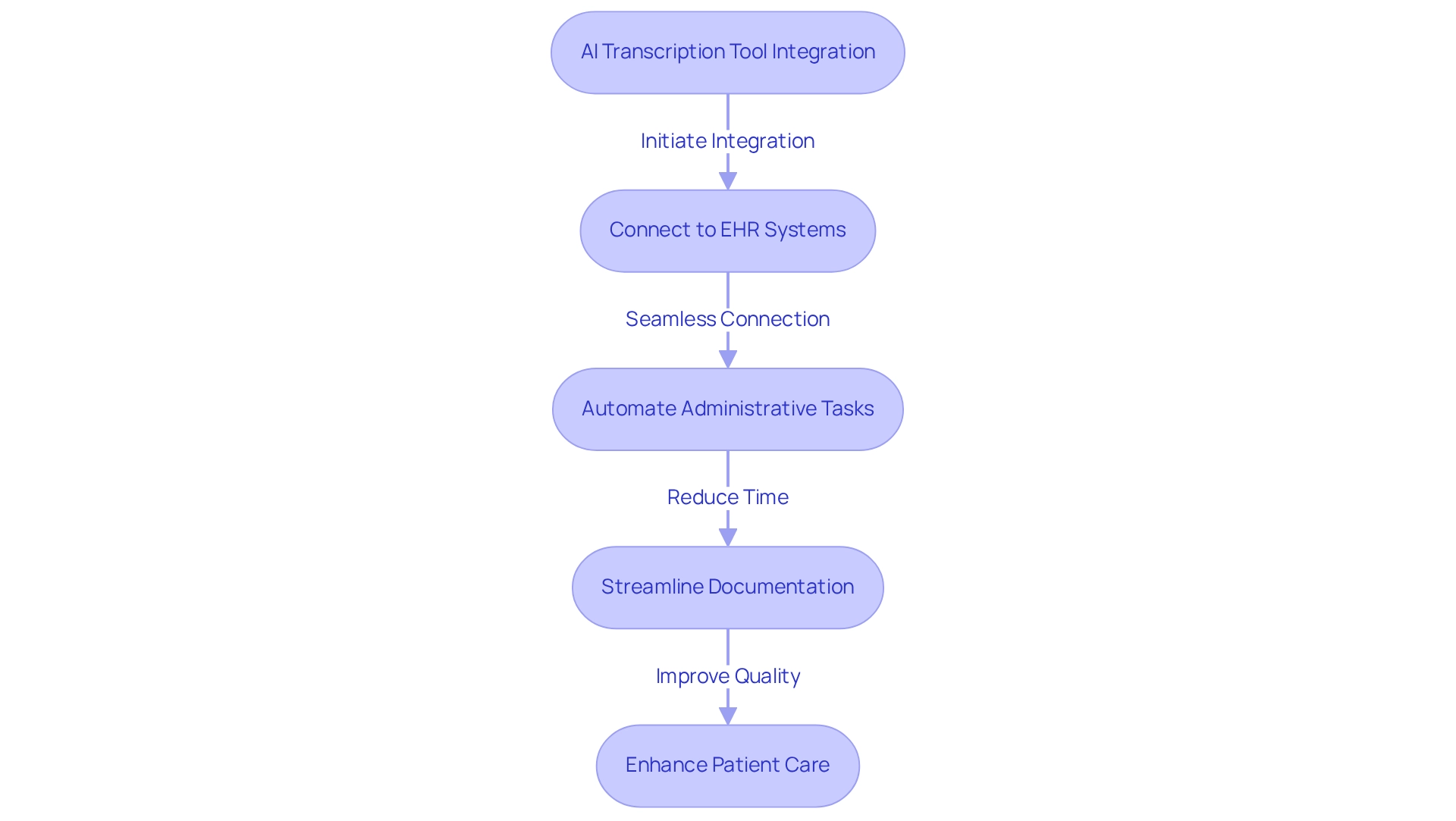
Ensure Safety and Compliance with AI Transcription Services
In the healthcare field, safety and compliance are paramount concerns, especially when it comes to protecting client data. understand these challenges and adhere strictly to regulations like HIPAA, ensuring that sensitive information remains confidential. By employing advanced security measures such as encryption and strict access controls, these services help alleviate the worries of healthcare providers.
For instance, Dialog Health exemplifies a strong commitment to HIPAA compliance with . This platform not only improves communication but also ensures that regulatory adherence is at the forefront. The efforts of Dialog Health demonstrate that HIPAA-compliant solutions can effectively safeguard individual information, fostering trust in medical technology—a trust that is essential for patient care. As healthcare providers consider integrating solutions like AI audio file transcription, they can do so with confidence, knowing that patient privacy is a priority. The ongoing discussions surrounding HIPAA compliance, particularly in light of a recent $115 million class action settlement related to breaches, highlight the critical need for robust security measures in medical technology. Senator Richard Blumenthal's observation reminds us that companies must design systems that prioritize user safety, especially for vulnerable populations like children.
This reinforces the importance of compliance in the design of medical technologies. As the landscape evolves, the advancement of scalable documentation solutions will further enhance safety and compliance. Healthcare providers can focus on delivering quality care, assured that they are nurturing trust with those they serve. Let us embrace these innovations, ensuring that we prioritize the well-being of our patients while navigating the complexities of technology.
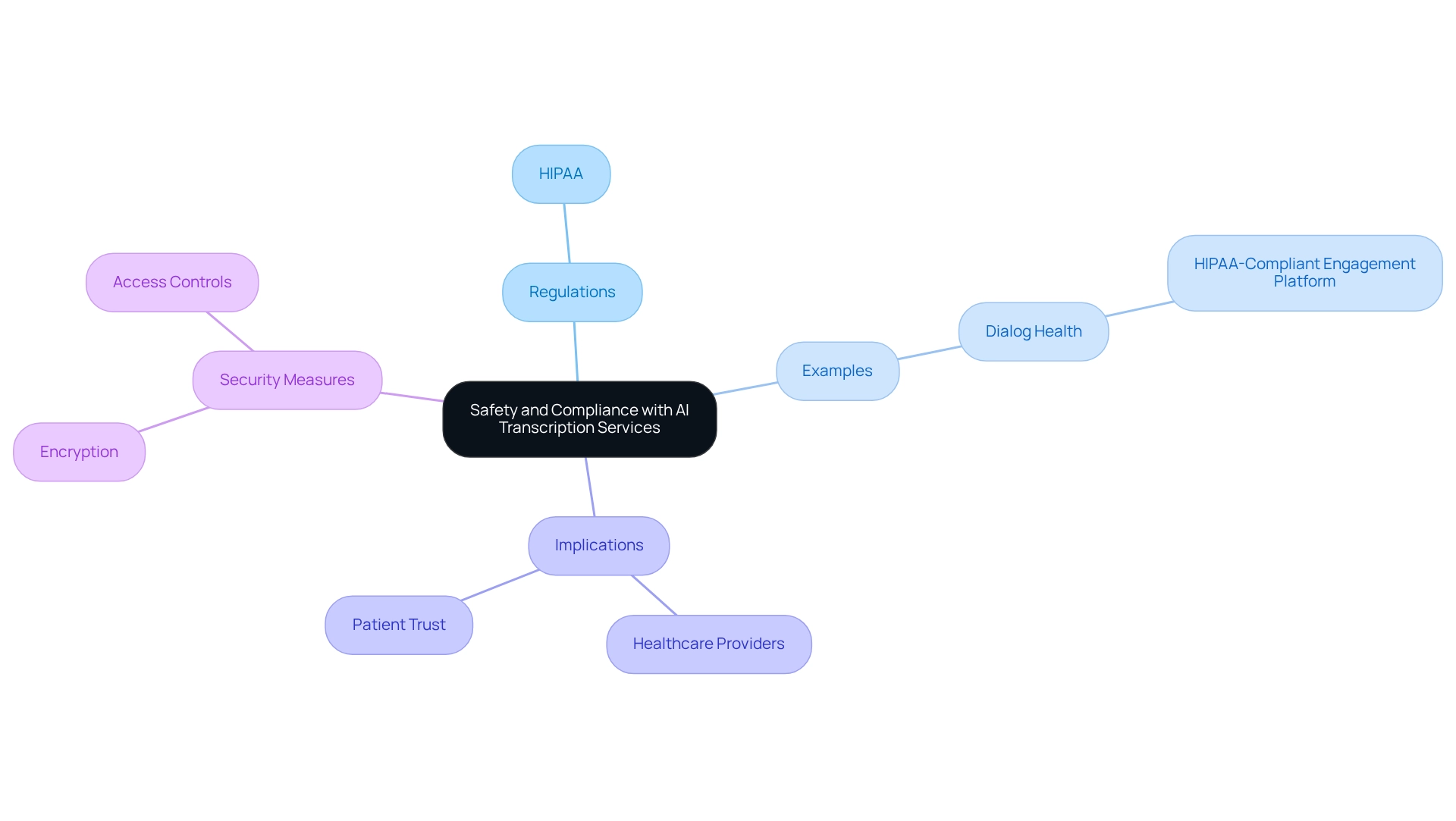
Leverage AI Transcription for Enhanced Diagnostic Guidance
AI text conversion plays a crucial role in enhancing diagnostic guidance by thoughtfully examining individual interactions and offering actionable insights to clinicians. By accurately capturing and transcribing detailed conversations, AI tools can identify patterns and suggest potential diagnoses. This enrichment of the clinical decision-making process not only streamlines workflows—such as appointment scheduling and medical record management—but also ensures that individuals receive timely and appropriate care. Ultimately, this leads to improved administrative efficiency.
Have you ever considered how AI can transform patient satisfaction? Statistics reveal that 39% of healthcare experts believe AI can enhance satisfaction among individuals, directly connecting to the advantages of AI documentation. By improving the accuracy and efficiency of documentation, AI text conversion can facilitate better-informed clinical decisions, thereby enhancing patient satisfaction and care outcomes. Expert opinions further emphasize that AI documentation improves diagnostic guidance by providing clinicians with essential insights that may otherwise be overlooked.
For instance, a study titled "Doctors' Perspectives on AI" highlighted that while many physicians recognize AI's potential to enhance medical outcomes—particularly pathologists who express optimism about AI's role—they also voice concerns regarding its implications for employment and care quality. This underscores the necessity for a balanced integration of AI technologies in clinical settings, ensuring that ethical considerations are prioritized.
In practice, AI audio file transcription tools not only facilitate accurate documentation but also provide support for diagnostic guidance by analyzing conversations for relevant clinical information. By utilizing these insights, medical professionals can make more informed choices, ultimately resulting in enhanced outcomes for individuals and greater satisfaction. It is also essential for medical professionals to consider the privacy policies and terms of use related to , ensuring that patient information is managed ethically and responsibly.
Implementing AI documentation effectively involves training staff on the technology, integrating it into existing workflows, and continuously evaluating its impact on clinical decision-making. Addressing physician concerns about innovation is crucial for successful adoption, as many medical providers are understandably cautious about changes that may affect care quality.
In summary, embracing AI documentation can lead to significant improvements in patient care, but it requires thoughtful integration and ongoing support. How can we work together to ensure that these technologies enhance our clinical practices while prioritizing the well-being of our patients?
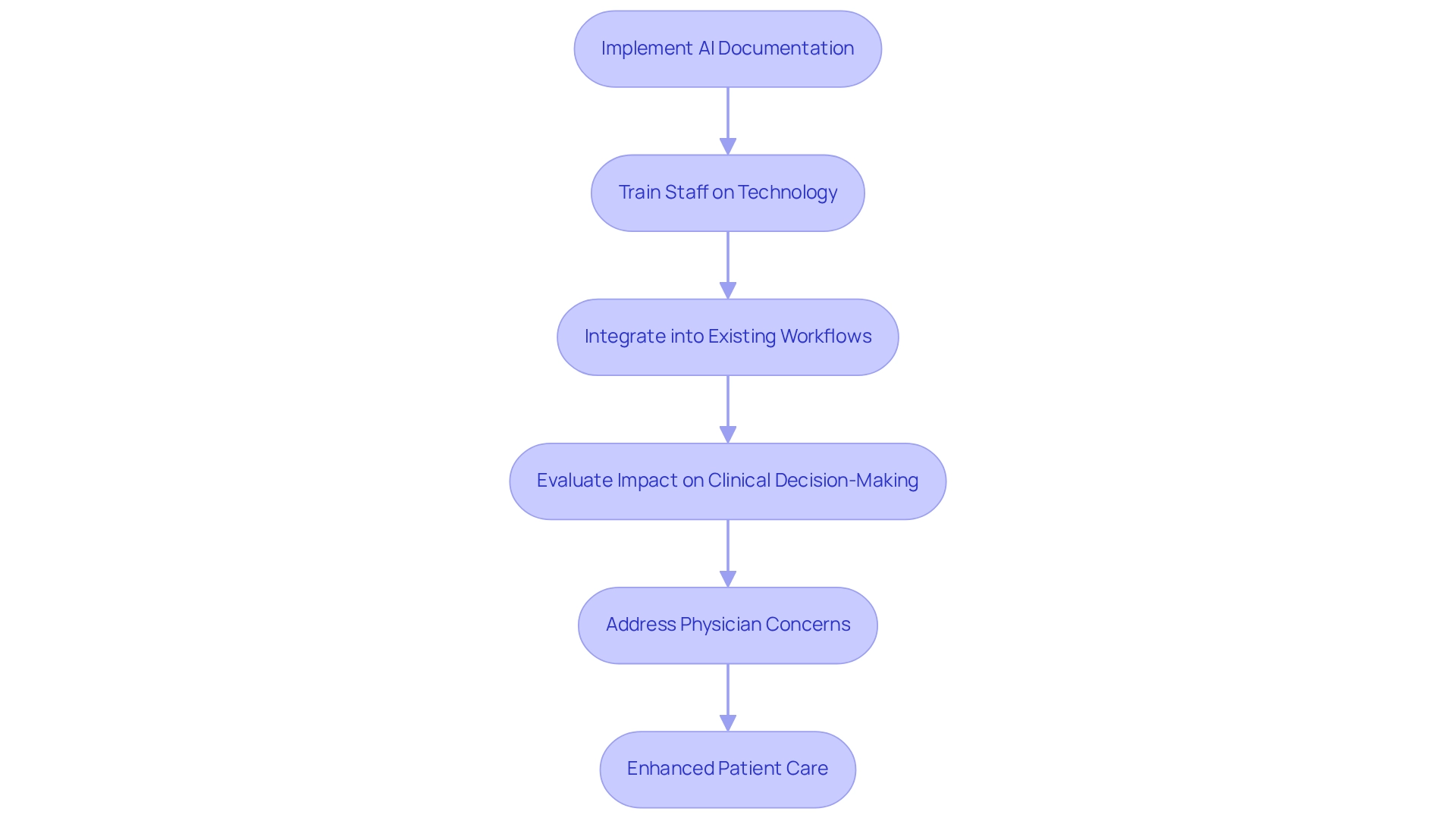
Explore the Future of AI Transcription in Healthcare
The prospects of AI documentation in medicine are remarkably promising, driven by swift advancements in natural language processing (NLP) and machine learning. These technologies are set to significantly enhance the precision and effectiveness of text conversion services. As AI continues to evolve, medical professionals can look forward to a greater integration of documentation tools into their daily routines, optimizing operations and improving the quality of patient care. It's noteworthy that the North American medical documentation market commands an impressive 92.50% share of the region, reflecting a strong demand for AI-driven solutions tailored to the unique needs of medical professionals.
Moreover, expert insights suggest that the ongoing development of NLP will lead to more intuitive and context-aware documentation systems, capable of grasping medical terminology and the nuances of patient-provider interactions. This progress is crucial as medical professionals navigate a landscape increasingly influenced by technology. Predictions indicate that by 2025, AI recording tools will become indispensable, offering capabilities that extend beyond basic documentation to include real-time clinical decision support.
In addition to improving accuracy in recordings, can significantly enhance administrative efficiency by automating labor-intensive tasks such as appointment scheduling, medical record management, and billing. By alleviating these pressures, medical providers can reclaim precious time to focus on delivering high-quality care to their patients, ultimately addressing the issue of physician burnout. Case studies highlight the transformative impact of these advancements, demonstrating that medical organizations adopting AI recording technologies see improved operational efficiency and better patient outcomes. For instance, North America is projected to lead the medical documentation market, representing over 45.8% of the share in 2024, supported by advanced medical infrastructure and stringent regulatory standards. This leadership underscores the importance of embracing AI recording technologies to remain competitive.
However, as Damian Chung, EdD, points out, medical practitioners should exercise caution regarding various vendors claiming to offer AI capabilities. It is vital to understand the true value and learning potential of each vendor's AI to make informed decisions. As the industry embraces these innovations, healthcare providers should actively seek reliable AI audio file transcription tools that enhance documentation and support clinical decision-making. This proactive approach will help ensure they stay ahead in an ever-evolving healthcare environment.
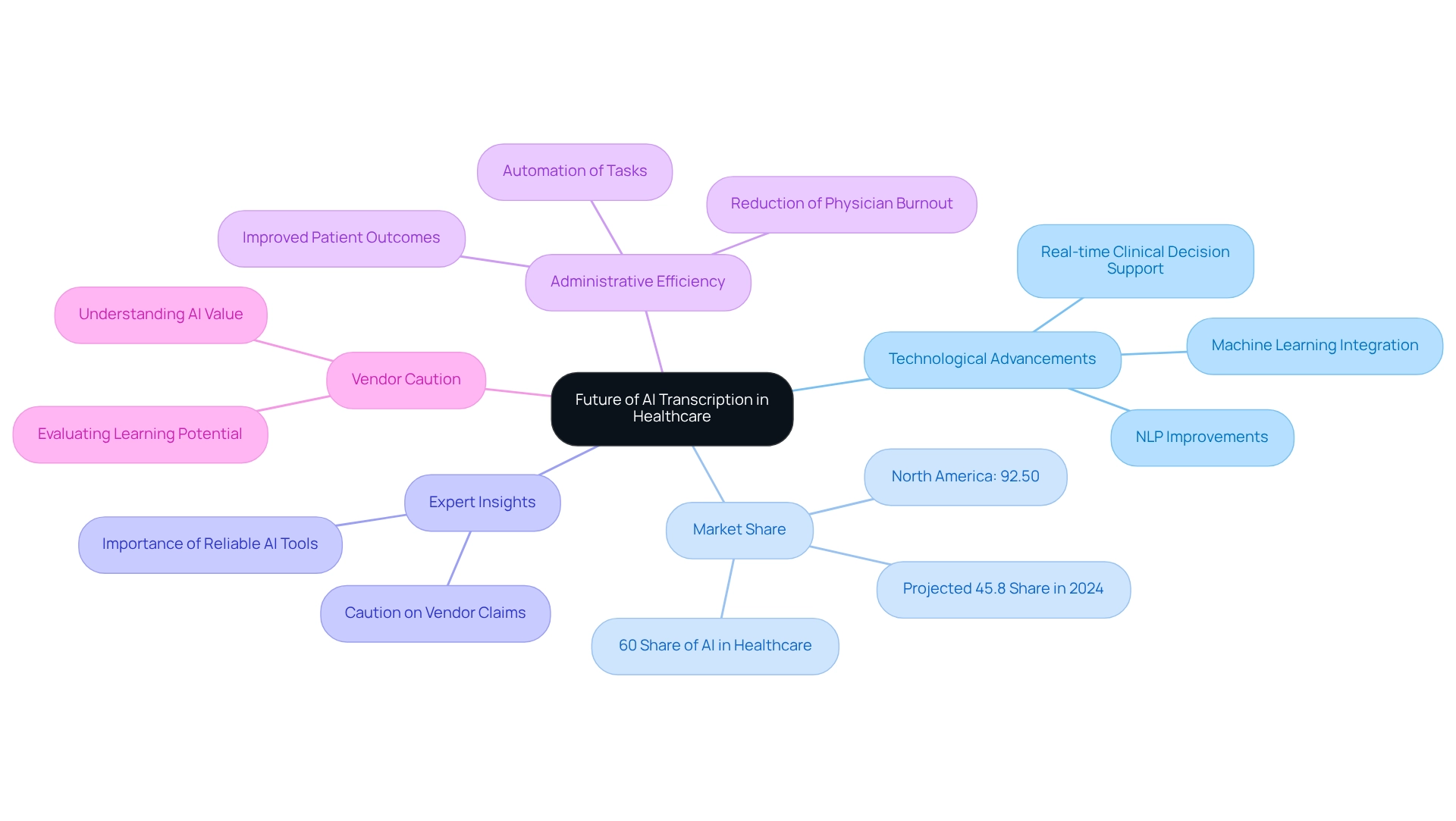
Conclusion
Embracing AI transcription technology signifies a transformative shift in the healthcare landscape, helping providers alleviate the overwhelming administrative burdens that can detract from patient care. By automating tasks such as documentation, appointment scheduling, and billing, AI transcription tools empower healthcare professionals to reclaim valuable time. This ultimately enhances the quality of care and fosters compassionate relationships with patients.
The integration of AI transcription not only boosts operational efficiency but also aligns with the ethical standards many healthcare providers uphold. Real-world examples, such as the successful implementations by organizations like Sutter Health and Fireflies.ai, illustrate how these tools can significantly reduce administrative load, enhance documentation accuracy, and improve overall patient satisfaction. Furthermore, maintaining compliance with regulations ensures that patient data remains secure, fostering trust in healthcare technology.
As we look to the future, the potential for AI transcription in healthcare is vast. Advancements in natural language processing and machine learning are poised to further enhance the capabilities of these tools. By proactively adopting AI solutions, healthcare providers can position themselves to thrive in an increasingly technology-driven environment, ensuring that the focus remains on delivering high-quality, patient-centered care. The call to action is clear: integrating AI transcription tools is not just an operational upgrade; it is a crucial step toward a more efficient, compassionate, and effective healthcare system.




